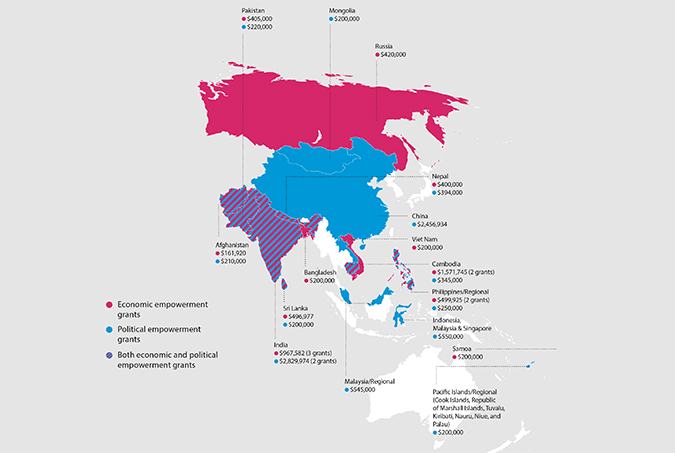FGE in Asia-Pacific
In Asia-Pacific, to date, FGE has allocated USD 13,504,056 to 33 women lead CSO’s to implement a total of 27 programmes (covering 24 countries across Asia-Pacific region). The current active portfolio of programs in Asia-Pacific is of 8 programmes led by 9 local women CSO’s, covering 11 countries for an amount of USD 2,714,925.
Results show that FGE-funded programmes in Asia-Pacific have improved women’s living and working conditions; enhanced business skills and opportunities; strengthened political participation and leadership; and supported gender-responsive legislative and policy changes. Some highlights from FGE Asia-Pacific programmes reported in 2015 include:
- In Nepal and the Philippines, over 800 indigenous rights advocates are better equipped with knowledge to consistently advocate for women’s rights. They have documented more than 270 cases of rights violations to support advocacy and provide evidence in legal processes. In the Philippines, this has led to the allocation of 5 per cent of local government budgets to Gender and Development Funds, and the inclusion of a shadow report on indigenous women’s rights in the 2016 session on the Convention on the Elimination of All Forms of Discrimination against Women (CEDAW).
- Professional Assistance for Development Action (PRADAN) and Jagori collaborated on an initiative to empower women in four regions of India with high poverty rates—Madhya Pradesh, Jharkhand, West Bengal and Odisha. Through structures for women’s mutual support, such as self-help groups, federations and economic collectives, selected members became community service providers, resource persons, trainers and leaders. In Madhya Pradesh, over 600 women from three project districts stood for local elections in 2015 and 69 per cent won seats—both reserved and open seats. The proportion of women attending village assembly meetings in all four states increased almost threefold to 63 per cent in 2015. Almost 32,000 marginalized rural women called on local decision-makers in local assemblies to secure basic services and entitlements, and recommendations made by women were included in five livelihood and social protection schemes.
- Since 2010, the All China Women’s Federation has worked to extend women’s participation in politics in China, reaching out to 1,700 policy-makers, 900 administrative and party school students, and over 8,000 men and women. Government officials, women’s groups and civil society organizations have gained capacities to monitor women’s political participation. In three provinces, the adoption of temporary special measures combined with new election guidelines resulted in a higher share of women in elected offices, up to 32 per cent of the members of Villagers Autonomy Committees in Hunan Province, for example. In 2015, the Chinese Human Resources Authority issued a regulation stipulating the same retirement age for female and male staff, improving women’s chances to rise to higher level management positions.
- In Mongolia, a new law passed in December 2015 specified that women must comprise at least 30 per cent of political party candidates, improving opportunities for women in the 2016 parliamentary elections. Collaboration among civil society organizations, including grantee Liberal Emegteichuudiin Oyunii San, helped propel consultations to draft the law and prevent regression—the previous 20 per cent quota resulted in 14.5 per cent women’s representation in Parliament. Fifteen women candidates trained by the grantee have been selected as the Best Political Activists of the Year, based on a public poll conducted by 50 national websites.
- In India, after IT for Change and Kutch Mahila Vikas Sanghathan established a network of 13 ICT-enabled infocentres run by women, local governments stepped forward to create another nine. The centres constitute a major innovation in public information outreach and entitlement-tracking, allowing women to more readily understand their rights and secure services. The centres have empowered women ‘infomediaries’, volunteers who mediate the flow of information between the community and various tiers of government. Some infomediaries have developed political aspirations and decided to run for local elections.
Latest news
01/05/2025
